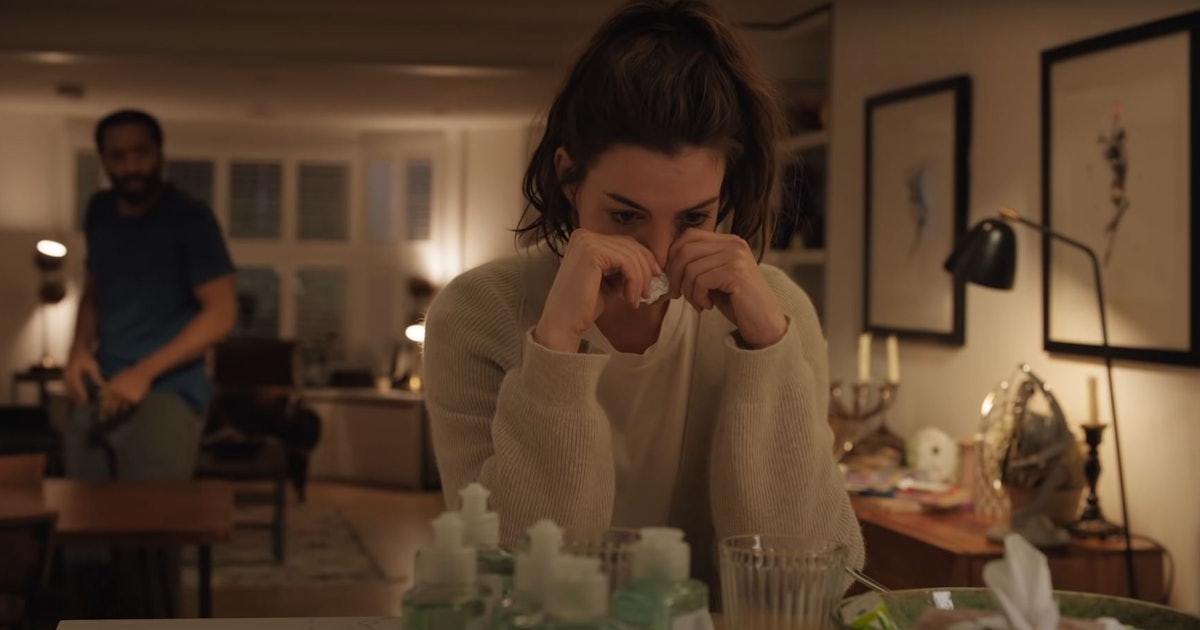Muddled, shallow and misguided. Hollywood’s first attempt at a COVID movie is frustrating to watch, mainly because of its unoriginal premise and disappointing execution. Locked Down follows two people who, despite their decision to break up, are living together during the first two weeks of the national lockdown. The film stars Anne Hathaway and Chiwetel Ejiofor, and was directed by Doug Liman.
The premise of this film promises a deep exploration of two people stuck together against their will, something that has been endlessly explored, most recently in films like The Lighthouse. To distinguish itself from these other movies, the expectation might have been for the creators to lean into an exploration of quarantine related-phobias specific to our time. Instead, the “descent into madness” depicted is fairly standard, with only Zoom to distinguish it from all the ones that came before it.
The characters go into lengthy monologues detailing their feelings and motivations, written and acted in a theatrical style. This choice simply does not work. Because their situation is so familiar to many, something most of us are still living through, the style, so detached from reality, comes off as insincere. It might have worked, had the direction matched this energy. However, this would have required focus, something that is severely lacking in the writing of this Locked Down.
This is evident with the tone of the film. It starts off with the aim of feeling claustrophobic, as it zeroes in on the lives of these two people in a closed space. Yet the sharp shift at the end doesn’t seem to conclude what the beginning of the film set out to explore. Not only does it not make sense with the plot, but it assumes tones of a plain comedy, rather than the attempt at dry humour of the first two acts. These, combined with some tropes and generalisations, leave the viewer confused and unsatisfied. The characterisation of the two people who go on the heist does not resemble that of the characters we saw in the house. They read as devices, going along with the plot, making the entire third act feel closer to a comedy sketch than the ending of a pandemic thriller.
Because of this lack of depth in their relationship, the finale feels as if it was meant for a different movie. Whereas for its first three quarters Locked Down attempts to explore the emotional conflict between the two characters, the final 15 minutes descends into a full-blown heist. That is, without the characteristics that make for a good heist. There is no clever plan, no seemingly insurmountable obstacle, no charismatic crew. Simply put, there are no thrills. The most anxiety inducing scenes involve characters not wearing masks around others in the middle of a pandemic.

Locked Down is also visually uninteresting. It is brightly lit, resembling the look of a comedy more so than whatever type of stage play this was trying to be. It is a missed opportunity. From cabin fever to drugs, all the elements were there for some kind of creative vision to take place. Instead, the viewer is left with a picture that is as disappointingly dull.
Another key flaw of the film is that it takes place during the first two weeks of lockdown. At this point of the pandemic, where most of us have gone without human contact for months at a time, watching two people struggle to keep it together for the first two weeks seems a like a stretch. COVID was such a large part of the marketing and the plot of the film, yet the couple’s problems are solved by the end of the film, when the pandemic is still active. The setting adds nothing to their conflict. In fact, their relationship is tied to material possessions. Not only does this cheapen the already two-dimensional emotional conflict presented, but it boils down the pandemic to the quarantine, ignoring the deaths and suffering that came because of it.
The actors do everything in their power to breathe some life into this movie. Both Anne Hathaway and Chiwetel Ejiofor bring the right energy, and do a great job given the spotty material, making parts of this movie stand out from the rest. Though the words fail them most of the time, the performances themselves are well done, with the casting of Hathaway being particularly suited to the role of a successful, yet self-doubting woman. Unfortunately the numerous cameos, including Ben Stiller and Mindy Kaling, distract from her best efforts, as they feel disjointed from the rest of the film.
Aside from the faults with the movie itself, the premise of this movie comes at a wrong time. A COVID centred plot is a tough sell. There cannot be that many people who wish to relive the confusion of those first few months, so selling a title like Locked Down should have felt like a challenge. Yet the material does not show the creators to be aware of this — they seem to revel in the quarantine, thinking the viewer will find the Zoom exchanges and bread jokes inherently entertaining.
The Verdict
This incoherent, visually dull mess forces viewers to sit through an annoyingly shallow two hours, while failing to highlight the most distinctive aspects of the pandemic in favour of bread jokes.
Rating: 3/10
Words By Elisabetta Pulcini
Support The Indiependent
We’re trying to raise £200 a month to help cover our operational costs. This includes our ‘Writer of the Month’ awards, where we recognise the amazing work produced by our contributor team. If you’ve enjoyed reading our site, we’d really appreciate it if you could donate to The Indiependent. Whether you can give £1 or £10, you’d be making a huge difference to our small team.
